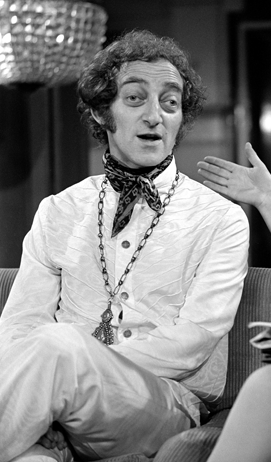
Marty Feldman
Martin Alan Feldman (8 July 1934[1] – 2 December 1982) was a British actor, comedian and comedy writer. He was known for his prominent, misaligned eyes.[2][3][4]
This article is about the actor. For the football player, see Marty Feldman (American football).
Marty Feldman
2 December 1982 (aged 48)
- Actor
- comedian
- comedy writer
1948–1982
2
BAFTAs: Best Light Entertainment Performance
1968 Marty
Best Writer
1968 Marty
He initially gained prominence as a writer with Barry Took on the ITV sitcom Bootsie and Snudge and the BBC Radio comedy programme Round the Horne. He became known as a performer on At Last the 1948 Show (co-writing the "Four Yorkshiremen sketch" which Monty Python would perform) and Marty, the latter of which won Feldman two British Academy Television Awards including Best Entertainment Performance in 1969.
Feldman went on to appear in films such as The Bed Sitting Room and Every Home Should Have One, the latter of which was one of the most popular comedies at the British box office in 1970.[5] In 1971, he starred in the comedy-variety sketch series for ATV called The Marty Feldman Comedy Machine. In 1974, he appeared as Igor in Mel Brooks' Young Frankenstein, for which he received the first Saturn Award for Best Supporting Actor. He died in 1982 of a heart attack while filming Yellowbeard in Mexico City.[6]
Early life[edit]
Feldman was born on 8 July 1934 in Canning Town, East London, the son of Cecilia (née Crook) and Myer Feldman, a gown manufacturer,[7] who was a Jewish immigrant from Kyiv, Ukraine. He recalled his childhood as "solitary" especially during his years of evacuation to the countryside during the Second World War.[8]
Feldman suffered from thyroid disease and developed Graves' ophthalmopathy, causing his eyes to protrude and become misaligned. Bruce Baum drew inspiration therefrom to record "Marty Feldman Eyes", a parody of "Bette Davis Eyes", in 1981.
A childhood injury, a car crash, a boating accident, and reconstructive eye surgery may also have contributed to his appearance.[2][4][8][9] He later described his appearance as a factor in his career success: "If I aspired to be Robert Redford, I'd have my eyes straightened and my nose fixed and end up like every other lousy actor, with two lines on Kojak. But this way, I'm a novelty."[10]
Career[edit]
Early career[edit]
Leaving school at 15, Feldman worked at the Dreamland funfair in Margate,[8] but had dreams of a career as a jazz trumpeter, and performed in the first group in which tenor saxophonist Tubby Hayes was a member.[11] Feldman joked that he was "the world's worst trumpet player."[11] By the age of 20, he had decided to pursue a career as a comedian.
Although his early performing career was undistinguished, Feldman became part of a comedy act—Morris, Marty and Mitch—who made their first television appearance on the BBC series Showcase in April 1955.[1] Later in the decade, Feldman worked on the scripts for Educating Archie in both its radio and television incarnations, with Ronald Chesney and later, Ronald Wolfe.
In 1954, Feldman met Barry Took while both were working as performers, and with Took, he eventually formed an enduring writing partnership which lasted until 1974.[1] They wrote a few episodes of The Army Game (1960) and the bulk of Bootsie and Snudge (1960–62), both situation comedies made by Granada Television for the ITV network. For BBC Radio they wrote Round the Horne (1964–67), their best-remembered comedy series, which starred Kenneth Horne and Kenneth Williams.[8] (The last series of Round the Horne, in 1968, was written by others.) This work placed Feldman and Took 'in the front rank of comedy writers', according to Denis Norden.[8]
Feldman then became the chief writer and script editor on The Frost Report (1966–67). With John Law, he co-wrote the much-shown "Class" sketch, in which John Cleese, Ronnie Barker and Ronnie Corbett faced the audience, with their descending order of height, suggesting their relative social status as upper class (Cleese), middle class (Barker) and working class (Corbett).[8]
Ascent[edit]
The television sketch comedy series At Last the 1948 Show raised Feldman's profile as a performer. The other three participants (future Monty Python members Graham Chapman and John Cleese; and future star of The Goodies Tim Brooke-Taylor) needed a fourth cast member, and had Feldman in mind.[8] In a sketch broadcast on 1 March 1967, Feldman's character harassed a patient shop assistant (played by Cleese) regarding a series of fictitious books, achieving success with Ethel the Aardvark Goes Quantity Surveying. His character in At Last the 1948 Show was often called Mr. Pest, according to Cleese.[12] Feldman was co-author—along with Chapman, Cleese and Brooke-Taylor—of the sketch "Four Yorkshiremen", which was written for At Last the 1948 Show, later adapted by Monty Python for their stage performances.[8]
Feldman was given his own series on the BBC, Marty, in 1968;[8] it featured Brooke-Taylor, John Junkin and Roland MacLeod, with Cleese as one of the writers.[8] Feldman won two BAFTA awards. The second series in 1969 was retitled It's Marty (this title being retained for the DVD release of the series).
Marty proved popular enough with an international audience (the first series winning the Golden Rose Award at Montreux) to launch a film career. Feldman's first feature film role was in Every Home Should Have One (1970).[8]
Death[edit]
Feldman was a heavy cigarette smoker for most of his life, often smoking five packets daily. He died of a heart attack[10] in a hotel room in Mexico City on 2 December 1982 at age 48[6] during the making of the film Yellowbeard; the film was subsequently dedicated to him. According to an editor's note in Feldman's posthumously published autobiography, Graham Chapman was with him at the time of his death.[25]
Feldman is buried in the Garden of Heritage at Forest Lawn – Hollywood Hills Cemetery, California, near his idol, Buster Keaton.[8]